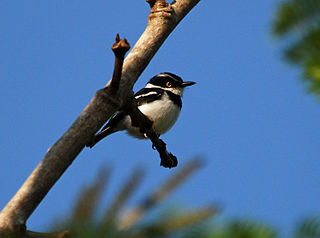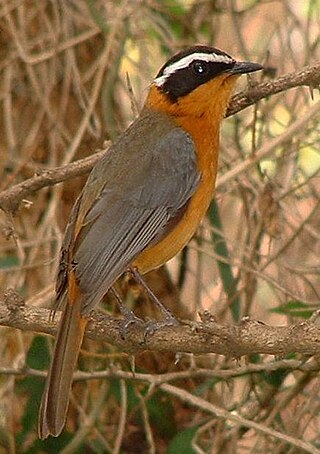
The tawny-flanked prinia is a small passerine bird belonging to the genus Prinia in the family Cisticolidae, a family of Old World warblers. It is widespread and common in most parts of Africa south of the Sahara. The plain prinia of southern Asia was formerly included in this species but is now usually considered to be a separate species.

The African paradise flycatcher is a medium-sized passerine bird. The two central tail feathers of the male are extended into streamers that commonly are more than twice as long as the body. The female tail feathers are of moderate length and without streamers. The upper parts of the male body, wings, and tail are boldly coloured in chestnut or rusty shades, but the underparts and the head are variably grey to blue-gray, with the head of the mature male being darker, commonly glossy black with greenish highlights. The beak and other bare areas, including a wattle ring round the eye, match the colour of the surrounding feathers. The female coloration is similar, though not so showy and glossy and with the head paler.

The grey kestrel is an African bird of prey belonging to the falcon family Falconidae. Its closest relatives are the banded kestrel and Dickinson's kestrel and the three are sometimes placed in the subgenus Dissodectes.

The bar-throated apalis is a small African passerine bird belonging to the genus Apalis of the family Cisticolidae. It is native to the eastern and southern Afrotropics.

The mountain buzzard is a bird of prey that lives in montane forests in East Africa, it and the forest buzzard of southern Africa were, until recently, considered to be a single species.

The tropical boubou or bell shrike is a medium-sized passerine bird of sub-Saharan Africa. This very diverse "species" with its numerous subspecies and morphs has since long posed a taxonomic problem, and recent research suggests it is a cryptic species complex that has now been split into several species.

The grasshopper buzzard is a species of bird of prey in the family Accipitridae which is found in a narrow zone of sub-Saharan Africa north of the equator.

The chestnut-throated apalis is a species of bird in the cisticola family Cisticolidae. The Kabobo apalis, originally described as a distinct species, is usually treated as a subspecies A. p. kaboboensis of the chestnut-throated apalis today. It is itself sometimes considered to be the same species as the Chapin's apalis.

The eastern black-headed batis is a passerine bird in the family Platysteiridae from eastern Africa. It was formerly treated as conspecific with the western black-headed batis.

The white-browed robin-chat, also known as Heuglin's robin, is a species of bird in the family Muscicapidae. Found in east, central and southern Africa, its natural habitats include riverine forest and thickets, and it is also found near humans. The IUCN classifies it as a least-concern species.

The white-tailed crested flycatcher is a species of bird in the flycatcher family Stenostiridae. It has a discontinuous distribution in eastern Africa. There are three subspecies, E. a. albonotata of central Kenya, and Uganda through to south west Tanzania; E. a. subvaerulea, which ranges from southern Kenya to Malawi and E. a. swynnertoni of Zimbabwe and Mozambique.

The mountain wagtail, also known as the long-tailed wagtail or grey-backed wagtail, is a species of wagtail of the family Motacillidae from sub-Saharan Africa.

The ashy flycatcher is a species of bird in the Old World flycatcher family Muscicapidae. It is found throughout sub-Saharan Africa, excluding the drier areas of South Africa, Botswana, and Namibia, where it inhabits subtropical or tropical dry forest, subtropical or tropical moist lowland forest, and savanna. It has a disputed generic placement, with different authorities variously putting it in Muscicapa, Fraseria, or other genera. Ashy flycatchers are mostly grey in colour, with pale grey or white underparts, and display no sexual dimorphism.

The golden-winged sunbird is a species of bird in the family Nectariniidae. Three subspecies are recognised. It is found in Democratic Republic of the Congo, Kenya, Tanzania, and Uganda.

The broad-tailed paradise whydah is a species of bird in the family Viduidae. It is found woodland and acacia savanna habitat in Sub-Saharan Africa from Angola to Uganda, Tanzania and Mozambique. A brood parasite, it has a wide range and the International Union for Conservation of Nature has assessed it as being of least concern.

Heuglin's white-eye, also known as the Ethiopian white-eye, is a species of bird in the family Zosteropidae. It is found in north-eastern and eastern Africa, primarily in Ethiopia and Kenya. Its natural habitats range from subtropical or tropical moist montane forests, to subtropical or tropical high-altitude shrubland, plantations, and rural gardens.

The little spotted woodpecker or green-backed woodpecker, is a species of bird in the family Picidae. It is native to large parts of tropical central Africa. It has an extensive range and is an uncommon species, and the International Union for Conservation of Nature has rated its conservation status as being of "least concern".

The brown-eared woodpecker is a species of bird in the family Picidae. It is native to the African tropical rainforest. There are two subspecies; P. c. caroli in the eastern part of its range and P. c. arizela, present from Guinea-Bissau in the west to Nigeria in the east. This bird has a wide range and is a common species in some areas, and the International Union for Conservation of Nature has rated its conservation status as being of "least concern".

The yellow-crested woodpecker, also known as the golden-crowned woodpecker, is a species of bird in the family Picidae. Some taxonomic authorities place this species in Dendropicos. Its typical habitat is wet tropical forest and it is found in Angola, Cameroon, Central African Republic, Republic of the Congo, Democratic Republic of the Congo, Gabon, Kenya, Nigeria, South Sudan, Tanzania and Uganda.
The rufous-bellied helmetshrike or Gabon helmetshrike is a passerine bird belonging to the Vanga family, Vangidae. It inhabits tropical forest in Central Africa. It is sometimes included within the chestnut-bellied helmetshrike of West Africa.



















